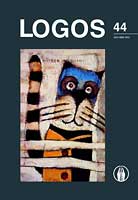TOMAS AKVINIETIS APIE SAPNUS
Thomas Aquinas on Dreams
Author(s): Christoph FlüelerSubject(s): Philosophy
Published by: Visuomeninė organizacija »LOGOS«
Keywords: dream books; revelatory dreams; corporeal cause of dreams; spiritual cause of dreams
Summary/Abstract: Starting with the Freudian notice on "ancient belief" that dreams foretell the future, Christoph Flüeler runs briefly through a history of this topic, picking up as his central focus the very theory of Thomas Aquinas. Describing the medieval context of Thomas, he mentions several popular ideas on how this was viewed in some previous centuries. The fact that dream books widely known at these times might have helped the wise man Lizdeika to interpret Gediminas' Dream, what urged him to set up Vilnius as the Lithuanian capital, might be interesting for Lithuanian readers. Following Aristotle, Thomas Aquinas was a bit more sceptical about the role of dreams in foretelling the future. The philosopher himself didn't take them very seriously, stating that "it is absurd to combine the idea that the sender of such dreams should be God with the fact that those to whom he sends them are not the best and wisest, but merely people at random. <...> For the mind of such persons is not given to thinking, but, as it were, derelict, or totally vacant." It is evident that Thomas, having in mind the importance of this kind of divination in the Bible, couldn't directly follow the aristocratic arrogance of Aristotle. Flüeler provides us with thorough statistics on a number of items related to an issue in the whole corpus of Thomas Aquinas' writings. They are not numerous and, except for one philosophical notice, are present only in Thomas' commentaries on the Old and New Testament. Yet it gives us a general idea on Thomas' position. It might be summarised as following: 1. The two realms of dreams, the natural and spiritual, are clearly separated. 2. Speaking on natural dreams, he followed Aristotle and argued that they could predict the future in terms of knowing the corporal dispositions, which can evoke health or illness. 3. Distinguished from these natural dreams are dreams with a spiritual cause. The main authority here is the Bible, mainly the Old Testament. In the spiritual realm, the moral concern is mainly how to distinguish good dreams from evil dreams evoked by demons. Thomas even tries to explain the process of illumination in sleep, to explain how revelatory dreams actually happen: "Good and evil angels can reveal what they know, namely by the application of their light on the (human) imagination, in a similar way that the light of the agent intellect is applied, and from those elicit intentions in the (human) intellect." This theory is developed in the Summa Theologiae (ST I 101.3) in the famous section on angels. The idea behind this is that angels cannot speak directly to human beings, so they have to influence our imagination, which is in an ordinary natural way affected by our sensations. People who are not subject to corporal affections are better disposed to divination in sleep, and, for Thomas, this proves that chastity is a virtue.
Journal: LOGOS - A Journal of Religion, Philosophy, Comparative Cultural Studies and Art
- Issue Year: 2005
- Issue No: 44
- Page Range: 80-95
- Page Count: 16
- Language: Lithuanian

